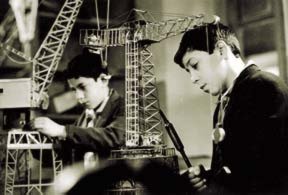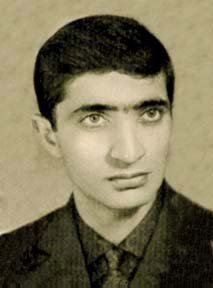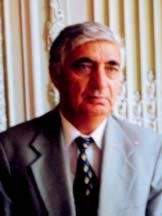|
Winter
1999 (7.4) Famous People:
Then and Now
Fikrat Goja in his youth and today. Fikrat Goja graduated from Maxim Gorky Institute of Literature in Moscow in 1964. Since 1967, he has held various positions in the Writer's Union of Azerbaijan where he was appointed Secretary in 1997, a position he still holds. Since 1978, he has been Executive Editor of Gobustan magazine. He has written many poems, most of which have been published. His major poetry anthologies include the following: Seagull (Gaghayi), When the Moon is Swimming in the Sea (Danizda ay Chimanda), I Owe Everybody (Hamiya Borjluyam), Human Character (Insan Khasiyyati), Starry Thoughts (Ulduzlu Dushunjalar), Sleepless Nights (Yatmadighim Gejalar), Life Pages (Omurdan Sahifalar) and Selected Works (Sechilmish Asarlar). Two more poetry books are scheduled to be published soon: Simple Truth (Adi Hagigatlar) and The Poems I Love (Manim Sevdiyim Sherlar). What experiences and interests in childhood would you say have shaped your life and career? I grew up during World War II. My father worked in the hospital so as a child I saw many wounded and hungry people living in miserable conditions, from hand to mouth. Those experiences influenced me a great deal and I'd say that period became my first teacher of poetry. You know, a poem is like a scream. One screams when he's been stepped on or injured - when something bad happens to him.  We had a good library at home, with lots of interesting books. I wrote my first poem when I was 13 years old. I don't remember exactly whether it was the result of witnessing any event, or maybe just a deep feeling that inspired me - the color of a tree: a black bough, green leaves. My first published poem was called "The Woman Who Couldn't Find Words." It was about a woman who was surprised about everything all of the time. She couldn't understand the things that were going on in the world around her. The fact that I was writing poetry was accepted very well in our family. My father used to write poetry himself, and maybe this ability passed from him to me. I used to read my poems to him and it made him very happy. How was your own childhood different from that of kids growing up today? There are really more similarities than differences. We have many refugee children today who have been orphaned by the Karabakh war, but we had war orphans when I was growing up, too. I don't see much difference between today's kids and those of the past. A clever man is always clever, a stupid man is always stupid. A wise man was once a clever child, and vice versa, a stupid old man was once a stupid child. What advice would you give to young people as they enter the 21st century? My advice to them is: Never cut yourself off from your roots. Let them strive to gain a good reputation. If you achieve something in life, your children and grandchildren will be proud of you. You must gain love and respect regardless of your profession. I would wish every man's life to be so good that when he reflects back on his childhood memories, he smiles. If man smiles, he acquires beautiful features. This makes the world beautiful. What would you say is your greatest achievement in life? What do you want to be remembered for most? Time will tell if I've managed to achieve something in my life. But my greatest achievement is that my children and my grandchildren are not ashamed to say my name. As far as the poems I've written so far, I can't name the best one among them because they're all like my children. For a loving parent, there's no difference.
I'm looking
for a friend, I don't have peace, The Sun is your
eye, |


